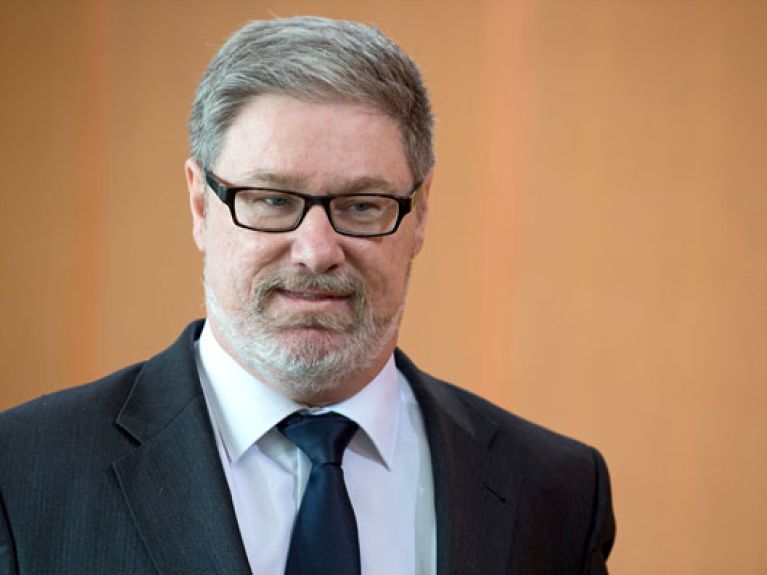Merkel’s trailblazer
Everything comes together in Lars-Hendrik Röller’s office: he is the Federal Chancellor’s “sherpa” for the G20 summit.

Germany. In the Himalayas sherpas carry climbers’ equipment up mountains, pitch tents and cook meals. Lars-Hendrik Röller is certainly not the Federal Chancellor’s quartermaster. And yet he is her “sherpa”. The tall man with the grey beard is preparing the path towards the summit of the 20 most important industrial and emerging countries and the European Union which Angela Merkel is hosting in Hamburg on 7 and 8 July 2017.
The professor of economics who will celebrate his 59th birthday a few days after the summit meeting has now headed the Directorate-General for Economic, Financial and Energy Policy in the Federal Chancellery for six years. This is also linked with the title of “Personal Representative of the Federal Chancellor for the G7/G20 Summits”. This position involves more work than glory. That is particularly the case when the summits are held in quick succession in your own country: first, the G7 summit in Elmau, Bavaria, in 2015 and now the G20 in Hamburg. Röller has had hundreds of telephone conferences and undertaken dozens of visits all over the world. Positions have to be sounded out, papers agreed. Who accepts what and how far will they go? Everything comes together in Röller’s office.
Cosmopolitan and multilingual
Merkel appreciates her cosmopolitan, multilingual adviser. Here a brief confirming nod, there a mischievous smile – the non-verbal communication also works well. The father of three feels more at home in the background than in front of the television cameras. Not he, but the Chancellor should be in the limelight.
His start as a lateral entrant from academia was not easy. Nevertheless, Röller soon learned how to handle the pitfalls of international politics. The son of the former CEO of the Dresdner Bank studied economics in the USA. Later he conducted research and taught in Fontainebleau near Paris, in Barcelona and in Stanford. From 1995 he taught industrial economics at Humboldt-Universität zu Berlin.
In 2003 he took his first little detour into politics as a consultant to the European Commission. Merkel noticed him during debates at the Chancellery. In 2006 he returned to Berlin to head a private university, later he moved to the Chancellery. Röller sometimes self-deprecatingly says that he has not shed his professorial tendencies.
Nevertheless, Röller is an effective worker: the G7 summit in Elmau, the second in Germany under Merkel’s leadership, is remembered as especially productive. According to an evaluation by the University of Toronto, 84% of the agreements have been complied with, which the researchers say puts it in second place in four decades of summits. If the Elmau summit represented the successful completion of Professor Röller’s political apprenticeship, then the G20 summit in Hamburg should make him a master of this craft.

